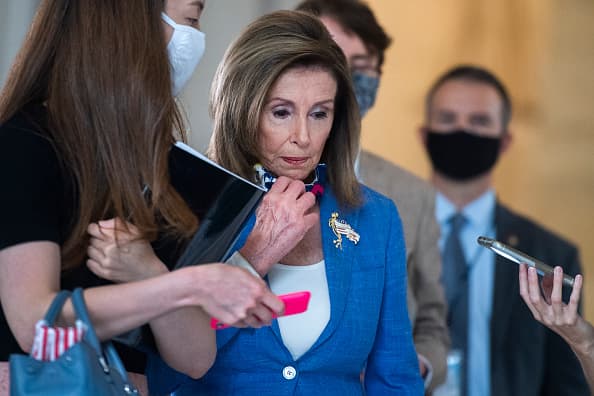
Speaker Nancy Pelosi, D-Calif., is pictured after a television interview in Russell Building on Friday, August 14, 2020.
Tom Williams | CQ-Roll Call, Inc. | Getty Images
House Speaker Nancy Pelosi said she spoke to Treasury Secretary Steven Mnuchin on Tuesday, but the pair failed to bridge a chasm between their proposals for more coronavirus relief.
“Sadly, this phone call made clear that Democrats and the White House continue to have serious differences understanding the gravity of the situation that America’s working families are facing,” the California Democrat said in a statement Tuesday following the 36-minute conversation.
Pelosi indicated the sides stand far apart on the price tag for a fifth package designed to alleviate economic and health-care crises fueled by the pandemic. Democrats first proposed more than $3 trillion in spending but later said they would accept a $2.2 trillion bill. The Trump administration has not gone higher than roughly $1.3 trillion.
The impasse risks dealing further damage to millions of Americans scrambling to cover rent and food costs as economic restrictions designed to limit Covid-19’s spread remain in place. Failure to pass more fiscal stimulus could also jeopardize the employment gains the U.S. has made in the last three months after record job losses early on in the outbreak.
Multiple financial lifelines passed to buoy the economy earlier this year have lapsed. A $600 per week enhanced unemployment benefit and a moratorium on evictions from federally-backed housing expired in late July, while the window to apply for Paycheck Protection Program small business loans closed in August.
President Donald Trump has deployed his limited powers to offer aid during the stalemate. His administration said Tuesday that it would use Centers for Disease Control and Prevention authority to halt evictions through the end of the year for individuals who make $99,000 or less and couples who make $198,000 or less. The expiration of eviction moratoriums around the country has led to fears of a housing crisis.
He previously signed executive orders to extend extra jobless benefits of at least $300 per week for some Americans for several weeks, continue federal student loan assistance until the end of the year and suspend the employee portion of the payroll tax. But his ability to provide relief does not go nearly as far as that of Congress, which controls federal spending.
On Tuesday morning, White House chief of staff Mark Meadows told CNBC that the sides have made “real progress” on pandemic relief. He noted that deciding on how much aid to send to state and local governments posed the biggest “stumbling block” for negotiators. Democrats want more than $900 billion in new relief, while the White House has offered $150 billion in additional funds.
Mnuchin testified before Congress about coronavirus relief on Tuesday. At one point, Rep. Maxine Waters, D-Calif., asked the Treasury secretary to call Pelosi to restart talks after he finished at the Capitol.
“Done,” he said. “I will call her right after the hearing.”
During his testimony, Mnuchin acknowledged the need for another bill to address Covid-19. He said he wants to “move forward on a bipartisan basis on points we can agree upon” — areas including unemployment insurance, small business loans and school funding.
While he blamed Democrats for what he called a refusal to compromise, Mnuchin said he is “willing to sit down at the negotiating table with the speaker with no conditions whatsoever any time.”
The Senate will return to Washington next week and will likely put forward a narrow coronavirus aid proposal. While it has little chance of becoming law, the GOP-held chamber aims to put more pressure on Democrats.
Congress has more to do than consider coronavirus aid when it comes back to the Capitol this month. Lawmakers also need to pass a plan to fund the government and prevent a shutdown before Sept. 30.
If both issues drag on long enough, Congress could potentially try to address them in one bill.




